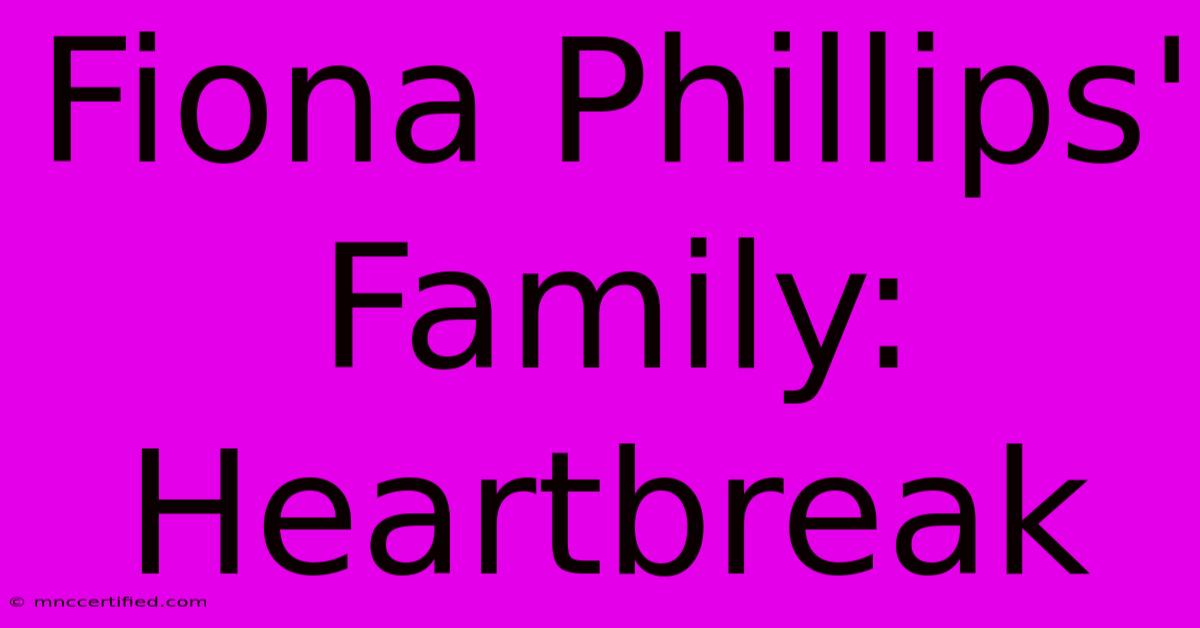Fiona Phillips' Family: Heartbreak

Table of Contents
Fiona Phillips' Family: Navigating Heartbreak and Public Life
Fiona Phillips, a beloved and respected figure in British television, has recently shared her heartbreaking diagnosis of Alzheimer's disease at the age of 62. This announcement has understandably cast a spotlight not only on her personal journey but also on the impact on her family. This article explores the challenges faced by Fiona Phillips and her loved ones, focusing on the emotional toll and the complexities of navigating such a devastating illness within the public eye.
The Weight of a Public Diagnosis
Fiona's decision to go public with her Alzheimer's diagnosis was undoubtedly a brave one. While offering a powerful message of hope and raising awareness, it also exposes her family to a level of public scrutiny that they might not have anticipated. This increased visibility can bring both positive and negative consequences.
Positive Aspects: Raising Awareness and Support
The public response to Fiona's announcement has been overwhelmingly positive, demonstrating widespread empathy and support. Sharing her story can help break down the stigma surrounding Alzheimer's disease, encouraging others to seek help and support earlier. Increased awareness can also lead to more funding for research and improved care.
Negative Aspects: Privacy Concerns and Media Scrutiny
The downside of public disclosure is the potential intrusion into the family's privacy. Media attention, while often well-intentioned, can be intrusive and overwhelming. Maintaining a sense of normalcy and protecting the family's emotional space becomes a significant challenge. The constant barrage of questions and speculation can be incredibly difficult to manage, especially during such a sensitive time.
The Impact on Family Dynamics
Alzheimer's disease profoundly impacts not just the person diagnosed but also their entire family network. Fiona's husband, Martin Frizell, and her sons, Mackenzie and Nathaniel, are undoubtedly facing significant emotional and practical challenges.
Emotional Toll: Grief, Anxiety, and Uncertainty
Caring for someone with Alzheimer's is emotionally exhausting. Family members often experience grief over the gradual loss of their loved one, even while that person is still physically present. Anxiety about the future, the progression of the disease, and the practical implications of caregiving are also common. Uncertainty about the future is a constant companion.
Practical Challenges: Caregiving and Financial Strain
Providing care for someone with Alzheimer's requires significant time, energy, and resources. Family members often have to adjust their work schedules, personal lives, and financial plans to accommodate the demands of caregiving. This can lead to significant financial strain and emotional burnout.
Navigating the Future: Hope and Resilience
Despite the heartache and challenges, Fiona's family, like many others facing similar situations, demonstrates incredible resilience and strength. Their unwavering love and support are vital in navigating this difficult journey.
Seeking Support: Professional Help and Community Resources
Accessing professional support, including counseling, support groups, and respite care, is crucial for both the person with Alzheimer's and their family. Connecting with other families facing similar challenges can provide invaluable emotional support and practical advice.
Focusing on the Present: Celebrating Memories and Making New Ones
While the future may be uncertain, focusing on the present moment and celebrating cherished memories is essential. Creating new positive experiences and memories can help sustain hope and strengthen family bonds.
Conclusion: A Testament to Strength and Love
Fiona Phillips' family's experience highlights the profound impact of Alzheimer's disease, not only on the individual diagnosed but also on their loved ones. Their journey is a testament to the strength of the human spirit and the enduring power of love in the face of adversity. Their story underscores the importance of raising awareness, supporting research, and providing crucial resources to families navigating this devastating illness. The public's continued empathy and support are invaluable as they face this challenge together.

Thank you for visiting our website wich cover about Fiona Phillips' Family: Heartbreak. We hope the information provided has been useful to you. Feel free to contact us if you have any questions or need further assistance. See you next time and dont miss to bookmark.
Featured Posts
-
Giants Cowboys Score Live Game Updates
Nov 29, 2024
-
Leicester City Programme Trevitt Interview
Nov 29, 2024
-
Home Insurance Naples Florida
Nov 29, 2024
-
Control Of Property Insurance
Nov 29, 2024
-
Rams Win First Patriot League Championship
Nov 29, 2024